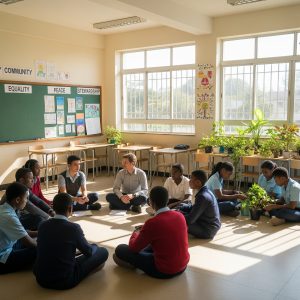Metacognitive Skills and Transformative Assessment in Resettling Juvenile Offenders: A Quaker Perspective – Integrating Reflection, Justice, and Compassion in Juvenile Rehabilitation
Introduction
The journey toward supporting juvenile offenders in their resettlement is a complex and multifaceted process. It requires not only practical interventions but also a deep understanding of the cognitive, emotional, and social dimensions that shape a young person’s capacity for change. Among the tools available for effective rehabilitation, metacognitive skills and transformative assessment stand out as powerful mechanisms for growth. When examined through a Quaker perspective—rooted in principles of peace, integrity, equality, and the belief in “that of God in everyone”—these approaches can be both compassionate and transformative.
Understanding Metacognitive Skills
Metacognition refers to the process of “thinking about thinking”—the awareness and management of one’s own cognitive processes. For juvenile offenders, especially those emerging from traumatic backgrounds or unstable environments, fostering metacognitive skills can be life-changing. These skills empower youth to recognize their thoughts, emotions, and behaviors, and to make conscious, reflective decisions rather than react impulsively.
- Self-Awareness: The capacity to observe one’s own mental states, thoughts, and emotional responses.
- Self-Regulation: The ability to control impulses, delay gratification, and persist through difficulties.
- Strategic Planning: Setting goals, identifying strategies to achieve them, and monitoring progress.
- Reflection: Looking back on actions and decisions to evaluate outcomes and learn from experience.
For juvenile offenders, these metacognitive processes are foundational for breaking cycles of offending. Developing them can help youth understand the antecedents of their actions, consider the consequences, and build resilience for the future.
Transformative Assessment: A Framework for Change
Transformative assessment goes beyond traditional evaluation by emphasizing growth, learning, and personal transformation rather than mere compliance or recidivism rates. It contends that assessment should not be punitive or static, but dynamic and dialogical, involving the young person as an active participant in their journey.
From this standpoint, transformative assessment involves:
- Collaborative Goal-Setting: Involving youth in defining what success means for them and co-creating pathways toward it.
- Holistic Evaluation: Measuring progress not just by the absence of negative behaviors, but by the presence of positive skills, relationships, and aspirations.
- Dialogical Interaction: Encouraging open communication between juveniles, mentors, assessors, and family members, fostering an environment of trust and respect.
- Iterative Feedback: Providing ongoing, constructive feedback that enables self-reflection and adjustment, rather than a single, static judgment.
The Quaker Perspective on Justice and Transformation
The Religious Society of Friends (Quakers) have a long tradition of involvement in criminal justice reform, emphasizing values such as simplicity, peace, integrity, community, equality, and stewardship (often remembered by the acronym SPICES). Central to the Quaker worldview is the belief that there is “that of God in everyone,” which mandates a restorative approach to justice—seeking healing and reconciliation, not punishment.
Applying these values to juvenile resettlement involves:
- Nonviolence and Peacebuilding: Prioritizing approaches that avoid further trauma, encourage peaceful conflict resolution, and promote healing relationships.
- Recognition of Inherent Worth: Seeing each young person as more than their worst acts, and honouring their potential for growth and contribution.
- Community and Belonging: Cultivating a sense of belonging and support that counters isolation and alienation, both of which are risk factors for recidivism.
- Truth and Integrity: Fostering honesty, accountability, and self-awareness in both the youth and those supporting them.
Metacognition in Practice: Strategies for Juvenile Offenders
Developing metacognitive skills among juvenile offenders requires intentional, supportive environments and practices that are both structured and flexible.
Reflective Dialogue and Journaling
Encouraging reflective practices such as dialogue, journaling, and guided self-inquiry helps youth articulate and process their experiences. In a Quaker context, these may take the form of “meetings for reflection,” where silence and open sharing support deep personal insight.
Mentoring and Modelling
Positive adult mentors can model metacognitive strategies—such as pausing before acting, naming one’s feelings, and considering alternatives. This relational approach echoes the Quaker emphasis on equality and mutual respect.
Restorative Practices
Restorative circles and conferences, rooted in Quaker tradition, invite offenders, victims, and community members to reflect together on harm done, needs, and ways forward. These practices build metacognitive awareness by requiring participants to consider multiple perspectives and take responsibility for their actions.
Goal Setting and Strategic Planning
Through collaborative goal-setting sessions, youth are guided to identify personal goals, anticipate challenges, and plan for setbacks—a direct application of metacognitive planning and monitoring.
Transformative Assessment: Implementing Change
To operationalize transformative assessment in resettling juvenile offenders, several components can be emphasized:
Personalized Assessment Tools
Assessment tools should be adapted to recognize individual strengths, traumas, and cultural backgrounds. Quaker values of simplicity and integrity call for tools that are straightforward, transparent, and do not pathologize.
Participatory Review Panels
Panels composed of youth, mentors, case workers, and sometimes community representatives can provide holistic feedback and encourage self-evaluation—mirroring the Quaker process of collective discernment.
Ongoing Feedback Loops
Rather than a single evaluation at the end of a program, regular feedback sessions create opportunities for youth to reflect, recalibrate, and celebrate growth, reinforcing the notion that transformation is a process.
Measuring What Matters
Success should be measured in terms of restored relationships, increased self-awareness, and positive engagement in the community, not just the absence of crime. These align with the Quaker belief in the transformative power of community and the importance of nurturing the whole person.
Challenges and Considerations
Implementing these approaches is not without challenges. Juvenile offenders may initially resist reflective or dialogical practices due to mistrust or trauma. Staff must be trained in trauma-informed care and cultural humility, and systems must allow for flexibility and genuine youth participation.
Hill House
September 2025

